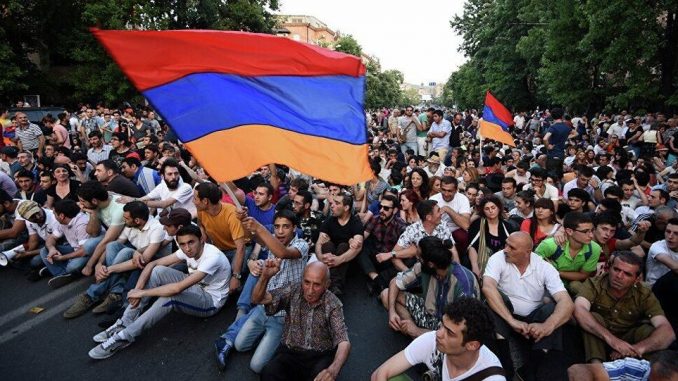
In Armenia, which suffered a crushing defeat in the last year’s Fall against Azerbaijan, Prime Minister Nikol Pashinyan is faced with a memorandum sent by the Armenian Armed Forces on the 25th of February. “Armenia’s prime minister and government are no longer able to make adequate decisions for the Armenian people in this crisis and fateful situation” was the statement in the memorandum. Made by 70 high ranking officers of the Armed Forces, with Chief of General Staff Onik Gasparyan on the Helm, which the police force also supported with the following statement of “We urge all our officers to refuse to comply with the illegal orders of Nikol Pashinyan and not use force against the people.”
Meanwhile, Pashinyan reached out to his supporters via a post on Facebook, demanding them to storm the streets of Erivan to support him and called on the army to comply with the orders of an elected official. He also issued a decree on the 24th, dismissing Chief of General Staff Gasparyan from duty which President Armen Sarkisyan refused to sign. Upon which, Pashinyan, accused Sarkisyan of collaborating with the instigators of the coup and demanded Gasparyan leave office of his own volition. After Pashinyan called his supporters out to the streets, the opposition groups assembled in front of the Armenian parliament.
The point the crisis has reached is not surprising at all after the defeat Armenia has suffered last November. That there would be negative political implications of the war and that Pashinyan would be in a difficult position after the defeat. The right wing opposition which align with Russia, whom the main figureheads of are Robert Kocharyan and Serzh Sargsyan, were prowling against pro-Western Pashinyan.
Thus, disagreements between Pashinyan and Sargsyan about why the Iskander missiles were not used in the Nagorno-Karabakh War, became a tension between the government and the army. The dismissal of Deputy Chief of General Staff Tiran Kacharyan after news reports of him making fun of the response Pashinyan gave to Sargsyan, which was “The rejected person should not ask questions, the answers to which he knows. Can he answer why the Iskander missiles did not work or why only 10% of them did?” News from the Russian press show that after the war, that the Iskander missiles were not used during the war became a serious source of tension between Pashinyan and the army.
On 25th of February, Ex-President Robert Kocharyan, who was arrested after the 2018 velvet revolution and has since been one of the leaders of the opposition against Pashinyan, has called out to the people of Armenia to collaborate with the army: “At this crucial moment, we call on you to be the owner of our state, to stand by our Armed Forces, the Armenian Army. The government that lost the war and handed over land must leave. That is the first necessary guarantee of our national revival, that is the imperative of today.”
Although after the war, Pashinyan’s legitimacy in the eyes of the Armenian people has eroded, this did not result in a shift towards the opposition. According to the survey results published by Gallup International, while 43,6% of Armenians that participated in the survey think that Nikol Pashinyan should resign, 38,8% think that he should not. In the survey, participants were asked to rate politicians from 1 to 5 and the results show that Pashinyan still remains as the highest rated politician with 2,8 points, followed by President Armen Sargsyan with 2,3 points. On the other hand, only 28,8% of the participants blame Pashinyan for the loss of the war. Another 16,1% think that the war was lost because Turkey joined the war and 4,4% blame the Armenian Ministry of Defence and some officers of the Armed Forces of Karabakh.
Despite the statistics are not absolute every time, this shows that in the current situation, the people of Armenia don’t perceive the bourgeois opposition as an alternative to Pashinyan. This is because prominent figures of the opposition such as Kocharyan and Sargsyan were in government for many years and could not even solve the smallest problems of impoverished Armenian working class. Poverty, economic trouble and corruption have all been covered up with a nationalist rhetoric and controlled tension with Azerbaijan over the Nagorno-Karabakh issue. Pashinyan’s popularity rose at 2018 because of his discourse to fight corruption, establish a western type democracy and to extend liberties.
However, with the pandemic, Armenia has been on a downward spiral regarding both the economy and public healthcare. And thus, just like his predecessor, Pashinyan sought the solution in nationalistic rhetoric and in increasing tensions with Azerbaijan over Nagorno-Karabakh. Meanwhile, reports have been circulating in the press over Pashinyan’s involvement in tobacco and diamond smuggling operation based in Afghanistan. Some reports even claim that Pashinyan has used government airplanes to smuggle goods. More concrete allegations point out to the corruption that some figures in Pashinyan’s circle are involved in.
In short, even if the memorandum was not declared, Pashinyan would eventually face one crisis or the other. What’s certain is, out of these tensions, there is nothing favourable for the impoverished working class of Armenia. Armenian labourers, who toil under an economic downswing created by years of isolation, do not foresee a bright future since there is no revolutionary alternative today.








